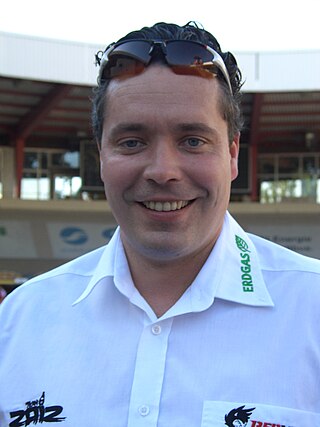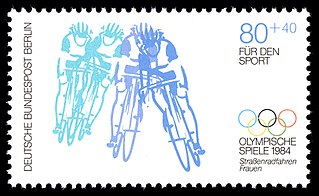
The men's sprint at the 2004 Summer Olympics (Cycling) was an event that consisted of cyclists making three laps around the track. Only the time for the last 200 metres of the 750 metres covered was counted as official time. There were 19 competitors from 13 nations, with each nation limited to two cyclists. The event was won by Ryan Bayley of Australia, the nation's first victory in the men's sprint after three times coming in second. Theo Bos of the Netherlands took silver, the Dutch team's first medal in the event since 1936. René Wolff earned bronze, stretching Germany's podium streak to four Games.

The men's sprint cycling event at the 1932 Summer Olympics took place on August 1 and 3. The format was a sprint of 1000 metres. There were nine competitors from nine nations, with each nation limited to one cyclist. The event was won by Jacobus van Egmond of the Netherlands, the nation's second victory in the men's sprint. It was the fourth consecutive Games that the Netherlands reached the podium in the event. France made the podium for the third consecutive Games, with Louis Chaillot taking silver. Bruno Pellizzari gave Italy its first men's sprint medal with his bronze.

The men's sprint at the 2000 Summer Olympics (Cycling) was an event that consisted of cyclists making three laps around the track. Only the time for the last 200 metres of the 750 metres covered was counted as official time. The races were held on Monday, 18 September, Tuesday, 19 September, and Wednesday, 20 September 2000 at the Dunc Gray Velodrome. There were 19 competitors from 14 nations, with each nation limited to two cyclists. The event was won by Marty Nothstein of the United States, the nation's first victory in the men's sprint since 1984 and second overall. Nothstein was the seventh man to win multiple medals in the event. The silver medal went to Florian Rousseau, France's first medal in the event since 1980. Two-time defending champion Jens Fiedler of Germany lost to Nothstein in the semifinals, but won the bronze medal match to become the second man to win three medals in the event.

The men's sprint at the 1992 Summer Olympics (Cycling) was an event that consisted of cyclists making three laps around the track. Only the time for the last 200 metres of the 750 metres covered was counted as official time. The races were held on Tuesday, July 28, Wednesday, July 29, Thursday, July 30 and Friday, July 31, 1992, at the Velòdrom d'Horta. There were 23 competitors from 23 nations, with each nation limited to one cyclist. The event was won by Jens Fiedler of Germany, the first victory in the men's sprint for Germany as a unified nation since 1936. Gary Neiwand of Australia took silver, the third time that nation had a runner-up in the event; Neiwand was only the fourth man to win multiple medals in the sprint. Canada earned its first medal in the men's sprint with Curt Harnett's bronze.
The women's 200m Sprint at the 1992 Summer Olympics (Cycling) was an event that consisted of cyclists making three laps around the track. Only the time for the last 200 metres of the 750 metres covered was counted as official time. The races were held on Tuesday, July 28, Wednesday through Friday, July 31, 1992 at the Velòdrom d'Horta.
The women's keirin at the 2011 Dutch National Track Championships in Apeldoorn took place at Omnisport Apeldoorn on December 29, 2011. 13 athletes participated in the contest.
The women's cycling sprint at the 2011 Dutch National Track Championships in Apeldoorn took place at Omnisport Apeldoorn on December 28, 2011. 5 athletes participated in the contest.
The women's individual pursuit at the 2011 Dutch National Track Championships in Apeldoorn took place at Omnisport Apeldoorn on December 28, 2011. 14 athletes participated in the contest.
The Men's keirin at the 2011 Dutch National Track Championships in Apeldoorn took place at Omnisport Apeldoorn on December 27, 2011. 19 athletes participated in the contest.
The women's individual pursuit at the 2008 Dutch National Track Championships in Apeldoorn took place at Omnisport Apeldoorn from 29 December to 30 December 2008. 12 athletes participated in the contest.
The women's points race at the 2008 Dutch National Track Championships in Apeldoorn took place at Omnisport Apeldoorn from 27 December to 30 December 2008. 24 athletes participated in the contest.
The women's individual pursuit at the 2012 Dutch National Track Championships in Apeldoorn took place at Omnisport Apeldoorn on December 28, 2012. 8 athletes participated in the contest.
The Men's keirin at the 2012 Dutch National Track Championships in Apeldoorn took place at Omnisport Apeldoorn on December 27, 2011. 12 athletes participated in the contest.

This page is an overview of the Netherlands at the UCI Track Cycling World Championships.

The men's sprint at the 1996 Summer Olympics (Cycling) was an event that consisted of cyclists making three laps around the track. Only the time for the last 200 metres of the 750 metres covered was counted as official time. The races were held on July 24 through July 28, 1996 at the Stone Mountain Velodrome. There were 24 competitors from 16 nations, with nations once again being allowed to have up to two cyclists each. The event was won by Jens Fiedler of Germany, the second man to successfully defend an Olympic sprint title. Curt Harnett of Canada also repeated as bronze medalist; he and Fiedler were the fifth and sixth men to win multiple medals of any color in the event. Marty Nothstein of the United States took silver, the nation's first medal in the event since 1984.

The men's sprint cycling event at the 1936 Summer Olympics took place on 6 and 7 August and was one of six events at the 1936 Olympics. There were 20 competitors from 20 nations, with each nation limited to one cyclist. The event was won, in a disputed final, by Toni Merkens of Germany, the nation's first medal in the men's sprint. Arie van Vliet took the silver medal, the fifth consecutive Games that a Dutch cyclist had finished in the top two. Louis Chaillot of France became the first man to win multiple medals in the event, adding a bronze to his 1932 silver; it was the fourth consecutive podium appearance for France.

The men's sprint at the 1960 Summer Olympics in Rome, Italy was held on 26 to 29 August 1960. There were 30 participants from 18 nations. For the first time since 1924, nations were allowed to have more than one competitor each ; for the first time since 1924, one nation took multiple medals. Italians Sante Gaiardoni and Valentino Gasparella won gold and bronze, giving Italy a four-Games podium streak with three total gold medals—second all-time behind France's five. Leo Sterckx's silver was Belgium's first medal in the men's sprint.

The men's sprint cycling event at the 1984 Summer Olympics took place from 31 July to 3 August and was one of eight cycling events at the 1984 Olympics. Once again, the limit on cyclists per nation was raised to 2. The event was won by Mark Gorski of the United States, the nation's first victory in the men's sprint and first medal in the event since John Henry Lake took bronze in 1900. The final was all-American, as Nelson Vails took silver. Japan earned its first medal in the men's sprint with Tsutomu Sakamoto's bronze. France's five-Games podium streak in the event ended.
The men's sprint cycling event at the 1988 Summer Olympics took place from 21 to 24 September and was one of the nine cycling events at the 1988 Olympics. There were 25 competitors from 25 nations. After the 1984 Games had featured a humongously bloated 34-cyclist, 11-round, 63-match competition, the competition size was cut down by restricting nations to one cyclist yet again and instituting a qualifying round: this reduced the format to 25 cyclists, 8 rounds, and 29 matches. The event was won by Lutz Heßlich of East Germany, the 1980 gold medalist who was unable to compete in 1984 due to the Soviet-led boycott. Soviet cyclist Nikolai Kovsh took silver, the best result to date for the Soviets. Gary Neiwand of Australia earned bronze; for both the Soviets and Australians, it was the first medal in the event since 1972.

The men's sprint event at the 1980 Summer Olympics took place on 23–26 July 1980 in Krylatskoye Sports Complex Velodrome. There were 15 competitors from 15 nations, with three additional non-starters. Each nation was limited to one cyclist. The event was won by Lutz Heßlich of East Germany, the nation's first victory in the men's sprint. Yavé Cahard took silver, extending France's medal streak to five Games despite the retirement of Daniel Morelon. Sergei Kopylov of the host Soviet Union earned bronze.








